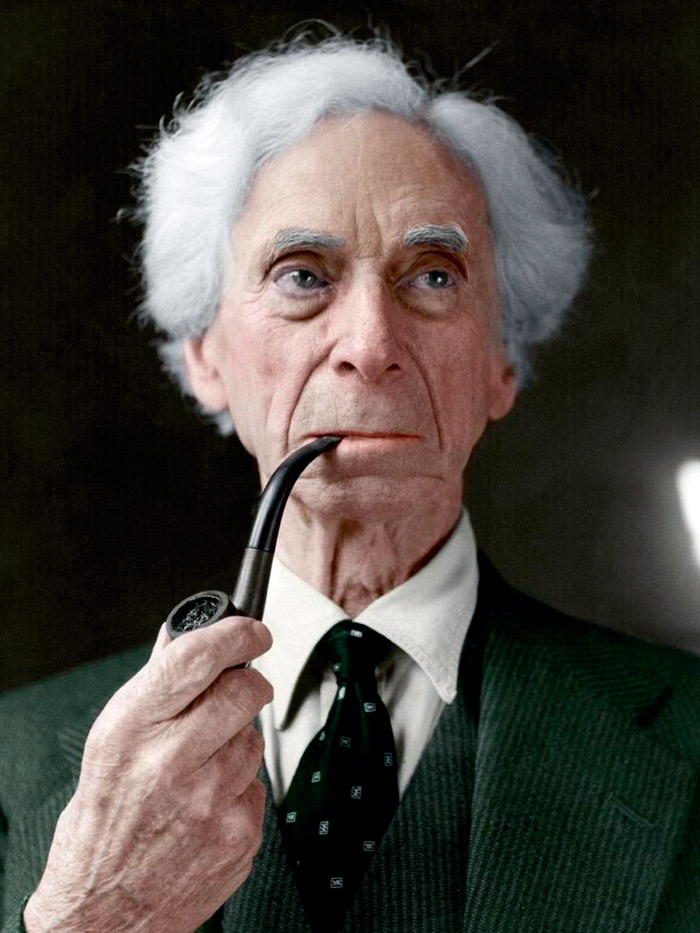Illustration: Vsevolod Shvaiba «Outcast II», ink, pen, paper, 40×86 cm
«WHY I’M NOT A CHRISTIAN»
«Just less than 11% of Nobel Prize winners from 1901 to 2000 were atheists and agnostics», states Professor John Lennox in his study. They did not believe in God and were outspoken about it.
In his atheist work «Why I am not a Christian», British philosopher, social activist, mathematician, and Nobel Laureate in literature Bertrand Russell writes the following:
«When you start to think about the argument of expediency, it is simply marvelous how people can believe that our world, with all the things in it, with all its imperfections, is the best that omnipotence and omniscience have been able to create for millions of years.
I really can’t believe it. Do you really think that if you were endowed with omnipotence and omniscience and given millions of years to perfect the world you have created, you could not create anything better than the Ku Klux Klan, the fascists, or Mr. Winston Churchill?»

Russell did not believe in God or immortality, nor did he share the faith of Christ, but he recognized a very high degree of moral virtue in Jesus Christ. The church was another matter. He considered her a stopper of moral progress:
«Look at the world around you, and you will find that every grain of progress in human feeling, every improvement in criminal law, every step taken to make the world less warlike, every step taken to improve the treatment of the colored races or every mitigation of slavery, every moral progress that has taken place in the world, has been invariably opposed by the organized churches of the world.
And with full responsibility for my words, I declare that the Christian religion in its ecclesiastical organization has been, and still is, the main enemy of moral progress in the world».
The soul of man is a strange mixture of God and brute, a battleground of two natures, the one particular, finite, self-centered, the other universal, infinite, and impartial
Bertrand Russell
HUMILITY OF INTELLECT
The question of belief in God is the leading question in the discussions of scientists of the early twentieth century. In 1998, for example, in the United States, a survey of college professors and graduates showed that 64% of the interviewees believed in God. As the level of education increased, the number of believers decreased. The same inverse relationship between religiosity and education was established in 39 British studies conducted between 1927 and 2002.
Professor Michael Argyle wrote about a clear inverse relationship — the higher the intelligence, the lower the religiosity — based on the results of a statistical meta-analysis. He analyzed research papers on the relationship between attitudes toward religion and IQ. The link between religiosity and low intelligence was also mentioned by researcher Satoshi Kanazawa.
Western civilization, it seems to me, stands by two great heritages», said Richard Feynman, one of the most famous physicists of the second half of the last century, author of diagrams, path integrals, and a course of lectures on physics, and Nobel laureate. — One is the scientific spirit of adventure — the adventure into the unknown, an unknown which must be recognized as being unknown in order to be explored; the demand that the unanswerable mysteries of the universe remain unanswered; the attitude that all is uncertain; to summarize it — the humility of the intellect.
The other great heritage is Christian ethics — the basis of action on love, the brotherhood of all men, the value of the individual — and the humility of the spirit. How can we draw inspiration to support these two pillars of Western civilization so that they may stand together in full vigor, mutually unafraid? Is this not the central problem of our time?»

God was always invented to explain mystery. God is always invented to explain those things that you do not understand
Richard Feynman
POOR EDUCATION?
Nobel Prize winner James Watson, who, along with Francis Crick, discovered the DNA double helix and has been called one of the most prominent scientists of the 20th century, also linked faith and poor education.
He asserted the following: «In my opinion, belief in the divine origin of man is linked to low levels of education. Yes, science in the United States is leading, but that doesn’t mean that all people get a good education. It varies greatly in our country.
As for religion, if someone wants to believe in God, that is their right. However, religion should not interfere with science, including the teaching of the theory of evolution. Truth, after all, comes from observation and experimentation, not religious revelation».

Academician Vitaly Ginzburg, a Nobel Prize winner in physics, while a convinced atheist, asked that atheists should not be identified with militant godless people.
«The more educated a person is, the less likely it is that he believes in God, is a theist», he wrote in his article «Reason and Faith». Ginzburg considered scientific thinking and belief in God to be incompatible if the latter «is invoked as an ‘explanation’ of some processes or phenomena».
According to him, the origin of life, the evolution of the universe, and any other natural-scientific problems are the subject of scientific study.
To involve God here, saying, for example, that God created living beings, means, in essence, to surrender, to abandon the scientific approach to the question of the origin and evolution of living organisms
Vitaly Ginzburg

RELIGION VS SCIENCE
However, the already mentioned Albert Einstein was still not an atheist. Although, perhaps, he saw God in a different way than the adherents of religions. Otherwise, he would never have written lines like these:
«Even though the realms of religion and science are themselves clearly demarcated, there is a strong interrelationship and interdependence between them. While religion may serve as that which determines purposes, it has nevertheless learned from science, broadly speaking, which instruments will lead to the attainment of the purposes it has outlined.
But science can only be created by those who are imbued with a desire for truth and understanding. But the source of this feeling comes from the realm of religion. It also comes from the belief that the rules of the world are rational, that is, comprehensible to reason.
I cannot imagine a real scientist without a strong belief in this. Figuratively, the situation can be described as follows: science without religion is lame, and religion without science is blind».

God is a gaseous vertebrate
Albert Einstein
To believe in God or not is a question to which each person must find the answer for himself, regardless of his regalia and purpose. This thought is traced in many works of Nobel laureates of different years.

